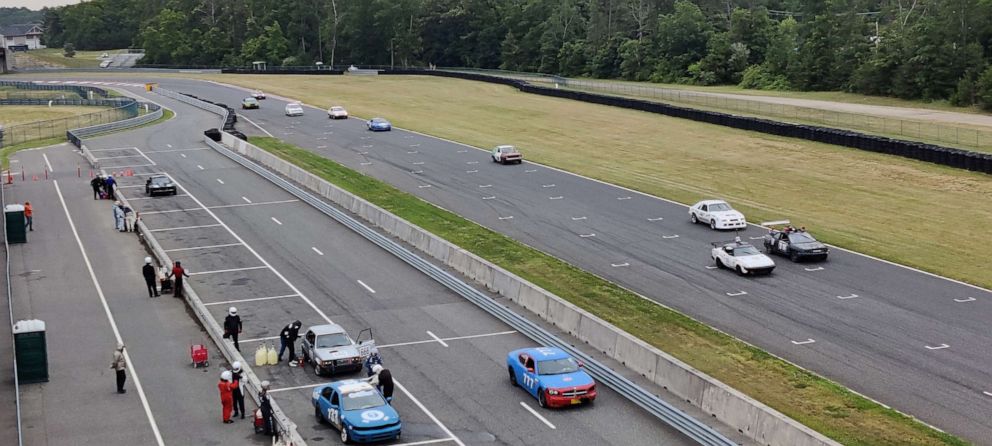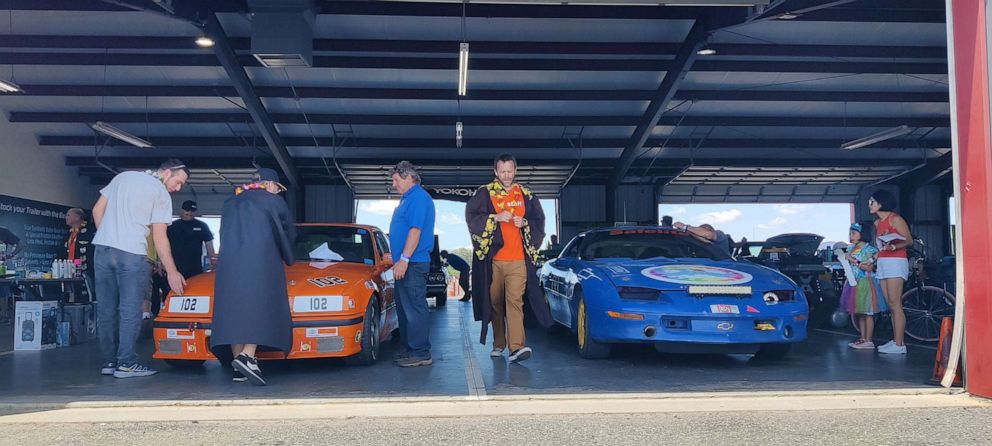24 Hours of Lemons aims to bring auto racing, and a sense of humor, to the masses
One guiding principle: No team can race a car that costs more than $500.
MILLVILLE, New Jersey -- From the glitz and glamor of Formula One, to the wide-open-throttle thrills of NASCAR, to the feat of human endurance that is the 24 Hours of LeMans, motorsport has thrilled and delighted gearheads around the world for generations. But this summer -- far from the cathedral-lined streets of LeMans, France -- a different kind of race was taking place just outside the small town of Millville, New Jersey: the 24 Hours of Lemons.
“The whole thing really flowed out of the fact that you could make the pun ‘lemons’ versus ‘LeMans,’” said Jay Lamm, co-founder and “Chief Perpetrator” of the event. “I don’t think we would've done it if that pun hadn't been available -- it was that tenuous.”
There’s just one guiding principle at Lemons races: no team is allowed to race a car that costs more than $500. In other words, only lemons are allowed.

Anyone with a driver's license can sign up for one of the approximately two dozen annual “Lemons” races that take place across the country. “Associate Perpetrator” Nick Pon said first-time visitors to Lemons races will find that a quick wit will often get you further than a quick car.
The Millville race, known in the Lemons world as “The Real Hoopties of New Jersey,” featured a colorful assortment of race cars during the June 11-12 event. Entrants included compacts like a Star Trek-themed Acura Integra, a VW Golf modified to look like a Dominos pizza delivery car, and a Saturn SL2 dubbed the “Sadturd,” for its restroom theme. BMWs from the 1980s and 1990s, as well as Hondas and Volvos were common. American iron was well-represented as well, with a My Little Pony-themed Chevy Camaro, a handful of Ford Mustangs, and even a late-1930’s Buick making an appearance. One team even brought a convoy of Cadillac Brougham sedans, replete with elaborate chandeliers hanging off the fenders and roofs -- a reference to cars from the 1981 Kurt Russell film, “Escape from New York.”
The man in charge of judging each car's race-worthiness is Eric Rood, also known as the “Justice of the Lemons Court.” On the Friday before the Millville race, teams wheel their cars through the event’s main garage, where Rood, dressed in a judge’s robes and a Hawaiian lei, gives his appraisal. At one point, Rood deems an orange, Dukes of Hazard-themed BMW 3- series “too nice” and “too clean” for the weekend race.
“I decree that this car is lame!” Rood shouts, which is met with a chorus of “lame!” from the rest of the bustling garage. He then takes a hammer to the BMW’s hood, and another Lemons organizer spray-paints a red “LAME” stencil on the rear fender. The driver is assigned a handful of penalty laps -- setting him behind the pack when it comes time to hit the track -- but is still allowed to race.
In addition to a $500 car, teams need to pay a $1,550 entry fee for each race, and have a Lemons Competition Membership ($75). Even still, keeping the racing relatively cheap is foundational to what Lemons' organizers say is their goal for the racing series, according to Lamm. He said it all started in 2006, when he and his friends were working as automotive journalists.
“We were all going to a lot of very expensive, self-satisfied and self-referential high-end car events constantly,” said Lamm. “It seemed that they were taking themselves very seriously and they were very, very interested in establishing a hierarchy of who was ‘most awesome’ over everybody else in the car world.”
Lamm said he then started calling up racetracks, pitching them the idea of a race that only featured cheap cars that were to be driven by him and about a dozen of his friends. “It took about 15 telephone calls for one that didn't hang up on me,” said Lamm.
The Lemons rulebook requires each car to be outfitted with a full roll cage, a racing harness and an onboard fire suppression system, among a litany of other requirements. Similarly, drivers have to wear a specialized head-and-neck restraint and fire-resistant clothing, as well as a full-face helmet. Safety equipment is not included in each car’s $500 valuation.

As with any racing series that's been going on as long as Lemons has, crashes happen.
“We had, uh, a bit of an accident that mildly totaled the car, and we had to build a new race car. I mean, that kind of dashed our hopes to run a couple more races the rest of that year,” said David Eckel, one of the drivers for Cheesebolt Enterprises, recalling an incident from a few years ago. But then, the team got a phone call from the company that constructed the original car’s roll cage, looking to build a new one.
“And I said, ‘what? I didn't order a roll cage.’ And they said, ‘uh, oh, well, you need to talk to this person because they're donating a new roll cage for you to build your next car,’” Eckel recalled. “You know, that's like a thousand dollar item to do that. And I was just bowled over.”
“You know, I've made these lifelong friends out of this thing, and that's what it really is all about, he said. “People making friends and building this community out of it is really the most satisfying part. And the part, I think, that will ultimately be the legacy of Lemons is, you know, these people who can talk about it in 40 years at the retirement home.”




